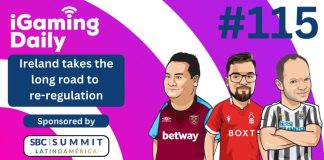Operators interested in entering the Dutch online betting and gaming market will have to factor in a range of considerations, notably advertising and affiliates, as outlined by Peter-Paul de Goeij.
In his appearance on the latest episode of the SBC Leaders Podcast with SBC’s Global Relationship Director, Kelly Kehn, the Managing Director of the Netherlands Online Gambling Association (NOGA) noted that the authority ‘is really paying attention to what is happening in the affiliate markets in the Netherlands’.
Under the system in place, operators are responsible and liable for any advertising conducted under their licence, meaning firms can face KSA scrutiny in the event an affiliate violates regulations. Consequences could include fines or even licence suspensions.
De Goeij remarked: “There is a very good step that has recently happened in the Netherlands, which is the affiliates got together and they set up a system in which you can get a stamp of approval, a rubber stamp of being a responsible affiliate.
“This is something that we look at with great interest and we think it’s the right way, and NOGA is also very much supportive of this initiative.”
The first 10 licensees for the Dutch market have been confirmed, whilst it was revealed earlier this year that a total of 28 operators have applied to join the market, although prominent firms Entain and Kindred will have to observe a ‘cooling off period’.
Enacted by the Kansspelautoriteit’s (KSA) – the Netherlands’ gambling regulatory authority – the cooling off period enforces that any operator which has violated the KSA’s prioritisation criteria prior to the opening of the online market on 1 October will have to observe the cooling off period before entering the sector.
Prohibited prioritisation activities include the targeting of Dutch customers with Dutch language services and Netherlands’ based payment providers, among other caveats.
“This of course gives the incumbent land-based industry that is going online a head start,” de Goeij observed.
“So in that respect, I don’t think that you could honestly say that there is a level playing field, but as NOGA, we decided to look at the future, and not look at the days past and the past almost 10 years that this new law has been debated at length and has been altered and changed, etc.
“We’re looking at the future and we’re very enthusiastic and very upbeat about the market’s potential, and we are basically calling on everyone, including the incumbents, to work together with us to make the Dutch market opening a huge success.”
Lastly, de Goeij emphasised how operators interested in the Dutch sector should leverage advertising not just to promote their commercial interests but also to dissuade consumers from illegal, black market offerings.
“Advertising is crucial when you want to channel consumers away from the illegal offer to the legal offer,” he explained. “If consumers don’t know that there is a legal offer out there how can they choose the legal offer? it’s crucial that new entrants and new members are able to advertise their offer to the Dutch public.
“The reason why we have been concerned and why we are becoming more concerned is that we see a tendency, even before the market is opening up, that parties are basically buying advertising time ahead of the market opening.
“This is normal, it is to be expected, but they are already infighting amongst each other for the best sponsor contracts or for the best advertising contracts. In recent months, there have been various occasions where the Dutch state lottery, for instance, went across the line of advertising and was targeting youth.”




